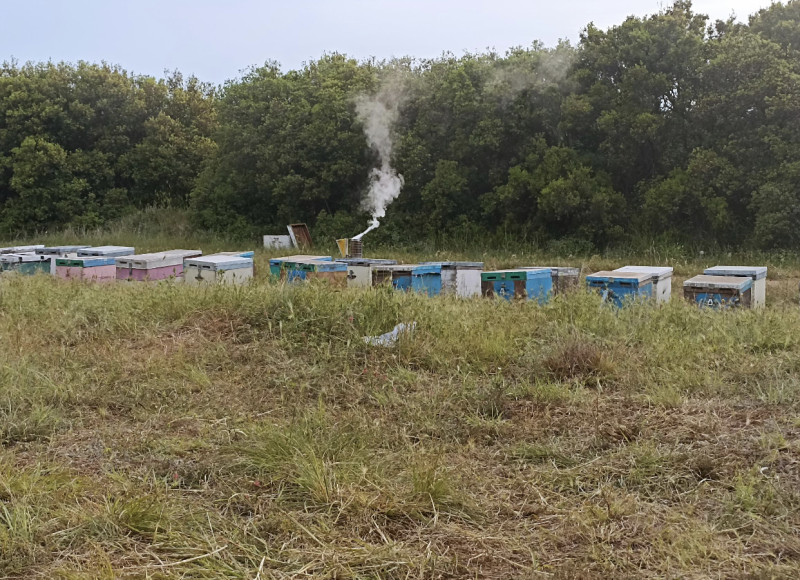Phenomena such as affesmos, the well-known swarming, in which the bees leave the hive with the old queen, are at an unprecedented level
The spring, which this year was more reminiscent of autumn, with continuous rains and low temperatures, negatively affected honey production in K. Macedonia. As the beekeepers of the area point out to the Athenian/Macedonian News Agency, their production has decreased by 70% compared to previous years, while phenomena such as aphesmos, the well-known swarming, where the bees leave the hive with the old queen, are in unprecedented outbreak.
“We experienced a spring that climatically was an unstable autumn, with a lot of rain and low temperatures, and this in beekeeping had the result that the rains constantly washed away the little nectar that the plants produced and we had a low nectar secretion”, explains the president to APE-MPE of the Beekeeping Association of the Prefecture of Thessaloniki Giorgos Hitoglou.
“We’re about 70-80% down on the honey that should be in the hive. In a month we will harvest normally, but the way things are, I don’t see it,” adds beekeeper Yiannis Theodoridis.
Bee hives across the country were on the brink of starvation this year
“With these temperature fluctuations many flowers were shocked and washed away by the rains, resulting in insufficient food in nature (nectar and pollen) to sustain the bees. In order to avoid the collapse of his bees, the beekeeper must provide food. Not to get production, as many mistakenly think, but for the bee to survive. The beehives throughout the spring, across the country this year were one step before starvation and the only thing that saved them was the timely interventions of the beekeepers. Clearly, there were also losses”, underlines Mr. Hitoglou.
“The amount of honey they have collected is also very low and this is because the daily rainfall washes away the plants, they go to bloom and their honey production is washed away by the rains and the bees cannot find honey to collect”, explains Yannis Theodoridis and disappointed emphasizes that “inside the hive all we find is pollen and brood. Honey is almost gone at this time the beehives should be at least double what they are. This has set our activity back quite a bit. We hope that the rains will decrease so that the plants can be honeyed, as we say, and collect honey.”
The swarming phenomenon is on the rise due to the rains
As beekeepers typically report, the unstable weather conditions did not only affect honey production, but have consequences in general on the habits of bees, as the phenomenon of swarming is on the rise. Swarming, as explained by the president of the Beekeeping Association of the Prefecture of Thessaloniki, is the natural reproduction of the bee. One bee becomes two, as a large part of the swarm leaves the hive with the old queen, leaving behind half the population with a new queen. But this creates a problem in production, as the bee that leaves “sits” on a branch and if the beekeeper does not “collect” it, it is lost. Also, where there was one productive bee, now there are two small, non-productive ones.
“The bees feel suffocated, when they are closed because of the rain, they want to leave and they get up and leave. Half the bee is left behind and weaker,” notes Mr. Theodoridis and explains: “They take the old queen and 60% of the hive’s young population and leave, set up for a couple of days in a nearby spot and create the well-known cluster, while then they find a new home, where they go to settle permanently, in a hollow of a tree. The phenomenon of release or swarming is very intense this year as a result of which we lose too many bees and every day we are called to hunt the bees to collect them and place them in the hive”.
The average honey production in Greece is ten kilograms per hive, explains Mr. Hitoglou, while the average in Europe is 17 kilograms per hive. “This year, as it seems so far, will not be a good year, so we expect production to drop a lot, which together with increased costs contributes to a completely justified discomfort for beekeepers. Our association recently highlighted the European Union’s official report on the trafficking of honey across its borders. We regret to note that in the three random sample checks he did at the borders of Greece, he also found three imports of irregular honey.
A total of 700 tons of honey were checked and we wonder how much more adulterated honey passed through our country. In the economic crisis we are experiencing, we understand that the consumer tends to prefer cheap honey – many times it is also eye-wateringly cheap. Such honeys are definitely not Greek. They are imported, obviously degraded, that meet (hopefully) minimum legal specifications. Many times we have seen recalls of such products in EFET announcements”, concludes the president of the Beekeeping Association of the prefecture of Thessaloniki.
Source: Skai
I have worked as a journalist for over 10 years, and my work has been featured on many different news websites. I am also an author, and my work has been published in several books. I specialize in opinion writing, and I often write about current events and controversial topics. I am a very well-rounded writer, and I have a lot of experience in different areas of journalism. I am a very hard worker, and I am always willing to put in the extra effort to get the job done.











